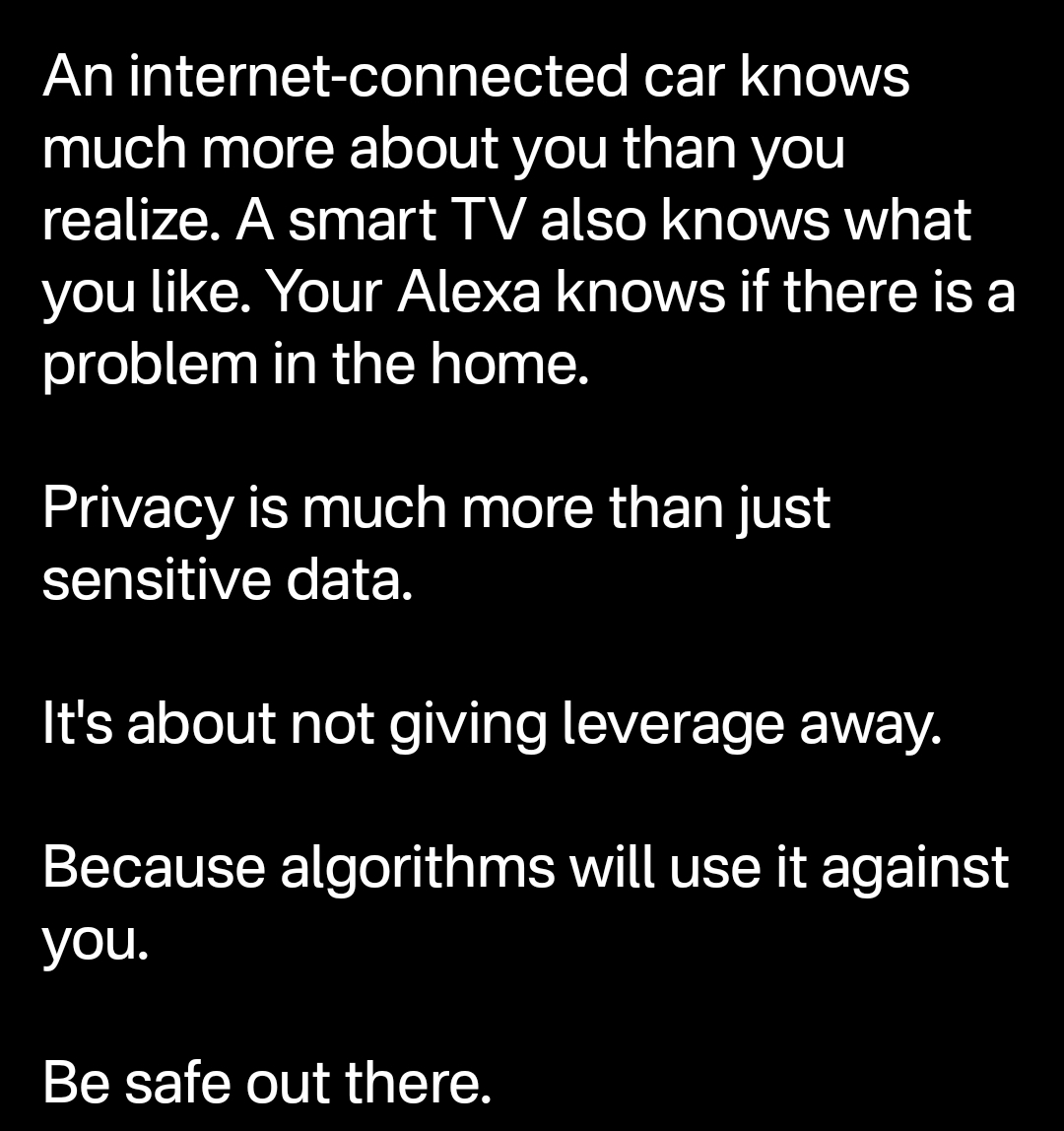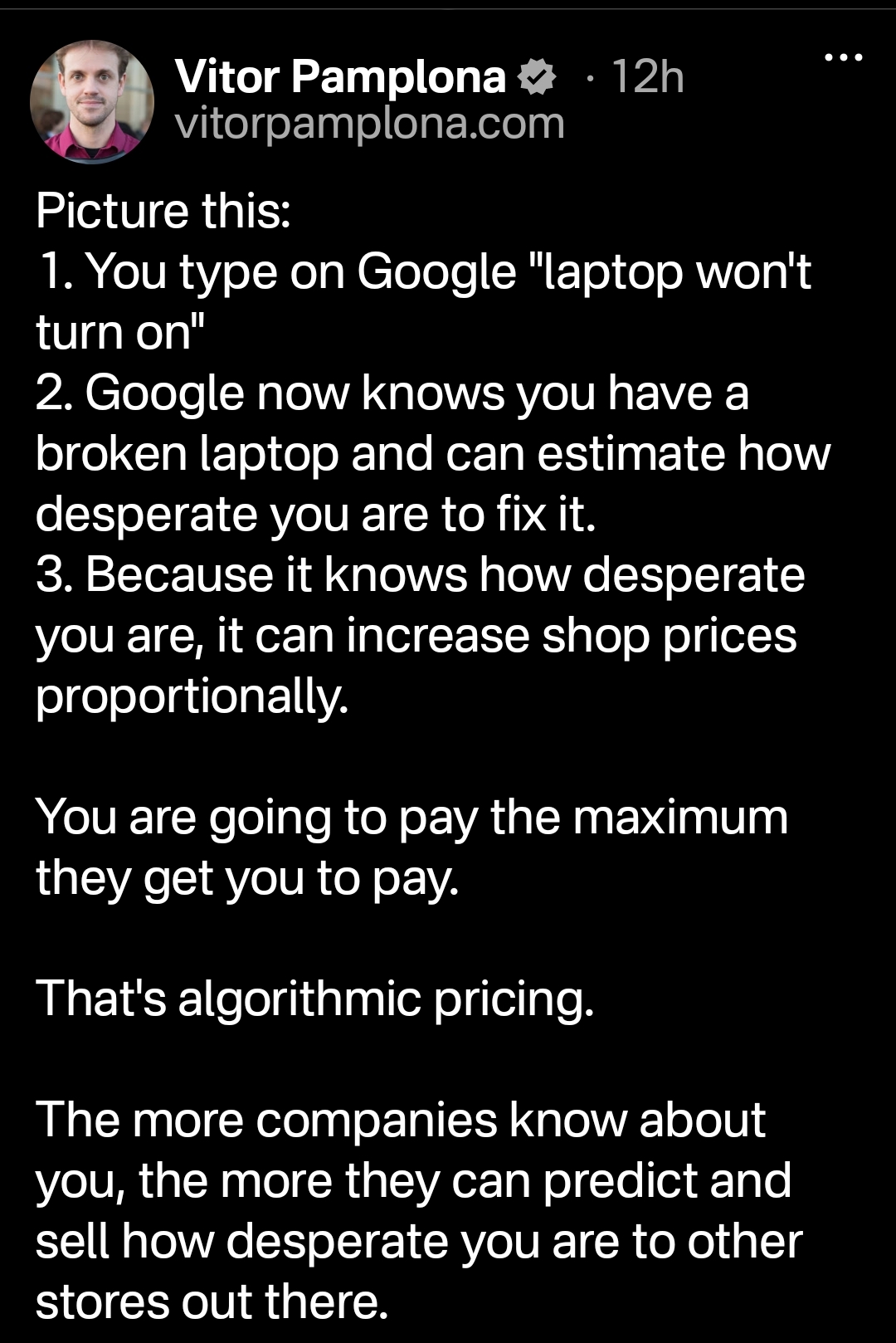this post was submitted on 15 Sep 2024
1398 points (97.3% liked)
Microblog Memes
6636 readers
2342 users here now
A place to share screenshots of Microblog posts, whether from Mastodon, tumblr, ~~Twitter~~ X, KBin, Threads or elsewhere.
Created as an evolution of White People Twitter and other tweet-capture subreddits.
Rules:
- Please put at least one word relevant to the post in the post title.
- Be nice.
- No advertising, brand promotion or guerilla marketing.
- Posters are encouraged to link to the toot or tweet etc in the description of posts.
Related communities:
founded 2 years ago
MODERATORS
you are viewing a single comment's thread
view the rest of the comments
view the rest of the comments


Here's the one that convinced my dad that connecting everything is bad:
Your smart fridge knows what's inside and knows you just added a 12 pack of soda and donuts to the shopping list. They sell that data to a bunch of companies, including your insurance company. They know you have diabetes.
Your insurance rates just went up for the fifth time this year because your insurance company knows what you're eating.
And it's a good thing you don't drink beer or your car insurance would have gone up 'due to increased risk factors.' too bad you wanted to buy a new car this year.
Not only can you not afford it now, the price went up because they know you want a car. I'm sure they would make a payment deal with you though.
And every company will know all about the deal, the beer, the donuts, and all it took was sending money to whatever company had the information, and they were more than happy to sell it.
The more we allow companies to freely operate like this without regulation and without proper punishment for breaking the rules, we will continue sliding toward the hellscape of Ferenginar. For the non trekkies, it's a hyper-capitalist species of profit-driven assholes.
The best thing is these companies will say it's not violation of your privacy because they sell the data without a direct link to your name or address. But guess what? They bundle it with all kinds of other identifiers like age, sex, weight, approximate location, whatever else you give them. The insurance company then takes that and modifies the category that is specifically this age bracket, approximate location, weight, age, beer and donuts in the fridge. And surprise! You fit all these "anonymous" identifiers.
But no harm done, your identity is safe 👍
it would seem like someone's name is the least useful data point
That's the whole thing about browser fingerprinting too. Take the set of internet users who have a particular version of a particular operating system, a particular version of a particular browser, having a particular set of typefaces installed, having a particular language preference, and you'll find yourself in the intersection of all of them.
Remember, kids, it only takes 32 bits to uniquely identify any person on the planet. That's 32 yes or no questions. Of course, they have to be perfectly crafted questions, but identifying power of fingerprinting must not be underestimated.
Clearly we all need to upgrade our personalities to a new 64-bit architecture.
Actually I think the world population is such that you need to add one or two bits.
Ok, fine, 33 bits 😂 Wikipedia says the world population is 8 billion, and python tells me that
math.log2(8e9)is 32.897.To add to this.
Here’s a website to help you check your own trackability:
https://coveryourtracks.eff.org
It can also help give you advice on how to improve your privacy.
Things that help: (tldr use adblockers but otherwise it’s really about blending into the crowd)
Hard to track: uses Firefox with uBlock origin. Maybe using a popular VPN. Uses an iPhone or a popular model of Android like the Pixel (although Google owning Android/Pixel might mean they get your data anyway…)
Actually very easy to track: uses a niche Chromium-based browser you got from GitHub with niche GitHub project as blockers and a little/known VPN. Uses a niche brand of smartphone with a niche non-Android based OS on it.
That was interesting.
Is there an add-on that changes the header information from an HTTP request to show bogus but common identifying information?
That is crowdsource the most common configurations and set that as the default in the add-on, so now you look like just another face in the crowd.
It’s more than just the header information. The graphics and audio checksum can give away details of what your device is, even if those details don’t match what header information you are sending. That mismatch is itself information they can use.
Brave is the only browser I can actually get a decent score with, too bad it has crypto brainrot
Names actually have a really high collision rate, so for collecting information they're not good. You don't want all the different John Smiths' data clumped together. They're useful once you start sending personalized stuff in though.
Well said and a core concept people need to understand to appreciate data privacy/sovereignty. Simply calling it data overlooks what it often is: your behavior over time. We don't call it PII but few things are more personally identifying.
when google gave away those google assistant spheres some years ago for free, i ordered one just to have one less of those fucking things out in the world. it went straight in the trash
It’s like Ron Swanson and the vegan bacon
I hope you also advised to only use cash. When you use a credit card, not only does Kroger or Walmart know your dietary habits, but many merchants share level 2 transaction data with your credit card company, so they know individual items in your receipt as well.
And if you enroll in those "apples/samsung/etc" pay services on your phone, those services also gain access to your purchase history, even if you never use the service.
I was surprised by a recent, popular comment here on lemmy where someone advised against using cash because of missing out on rewards. A majority of people don't appreciate the tradeoffs here. By default, banks and private companies have more info on us than we have on ourselves. To think that they're going to do anything that benefits us more than them is naive. While not everything is zero sum, we are talking about extractive, profit seeking industries.
Cash seems like the best defense on this front. I recent switched back to cash, and continue to track my own finances; Bank sees $500 withdrawal; I see $34.45 at grocery store, $19.20 at hardware store, etc.
Pro tip: try random but memorable phone numbers at checkout. Now you can enjoy the savings, and salt/contaminate the data extraction of others. The more randomness (where and when you shop, what you buy, which numbers you use) the better.
That's a great tip to use someone else's phone number! I use my mother-in-law's phone number. I will never convince her not to use these reward programs, so may as well pile them on.
And the health apps know when you're sleeping, they know your heartrate throughout the day, your o2 sats. They can take all this mortality risk data to factor in things, advertise drugs to you, advertise foods they know you'll eat even though it's bad, manipulate how your insurance pays out for your next treatment because it would have been preventable if you hadn't eaten those donuts. The phone manufacturers know you run apps, how long, what you do (yes, even Apple, especially Apple, they hide behind "privacy" so you feel ok with what they do to you) what web pages you open, how long you view them.
They could biometrically paint a picture of your day, your movement, there's an entire profile of data available on many humans. I wouldn't be surprised if they aren't already tying heart rate data to viewership of media and advertising.
So, FUD, then?
This only sounds bad for people with a love of beer and donuts.
Admittedly, I am included within that group. But if I wasn't, I could see supporting such variable rates.
People can't keep sacrificing what they like just to survive. There's no point if you don't get to live
Do you think you are disagreeing with me?
First they came for the beer and soda drinkers, and I did not speak out—because I did not drink beer and soda.